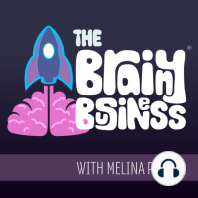50 min listen

232. Leveraging the Power of Prefactual Thinking (Refreshed Episode)
FromThe Brainy Business | Understanding the Psychology of Why People Buy | Behavioral Economics
232. Leveraging the Power of Prefactual Thinking (Refreshed Episode)
FromThe Brainy Business | Understanding the Psychology of Why People Buy | Behavioral Economics
ratings:
Length:
28 minutes
Released:
Nov 1, 2022
Format:
Podcast episode
Description
Today’s episode is all about prefactual thinking. Prefactual thinking is closely related to counterfactual thinking, which was episode 68 of the podcast, and this episode originally aired as number 71. In its simplest form, counterfactual thinking is our “what ifs” and “if onlys” where we look back and wonder what might have been if only something had been different. This can be from outside factors or things within ourselves that might have changed an outcome, and our brains are really good at coming up with idealized scenarios where things would have been amazing and perfect “if only” this one thing had been different. Prefactual thinking is when we do something very similar but are looking into the future. Why did I hand pick this episode for you to listen to and reflect upon today? This coming Friday, my guest in episode 233 is Leigh Caldwell. He will talk about why he believes there is actually a System 3. You’ve heard me talk about System 1 and 2 (or rather, the subconscious and conscious processing of the brain...our elephant and rider) and Leigh says there is something else in there that should be its own category altogether. It has to do with imagining and thinking into the future, so it felt like a good idea for you to have a nice refresher on prefactual thinking today so you are all set and ready to be thinking about this possible System 3 question on Friday. So, as you listen today, think about the possibilities and what might come, and be ready to reflect on this when you tune in for episode 233. (And, if you haven’t already, now is a great time to subscribe to the podcast to be sure you don’t miss it!) Show Notes: [00:38] Today’s episode is all about prefactual thinking. Prefactual thinking is closely related to counterfactual thinking. [01:25] While counterfactual thinking is looking back at how things in the past might have been different “if only”...prefactual does something similar, but looking into the future. [03:39] Goals are so important. As the year is ending you are looking back at what you did, and what you could have done, and also looking forward to what you can do in the future. [04:33] Counterfactuals are looking back at something that has already happened and essentially undoing it in some way in your mind. Prefactuals are when you look to the future and think about what could be. [05:54] When you think about what could happen or how you might succeed in the future, studies show you can actually have great benefits in all sorts of tasks. [07:06] Your brain is driven by its desire to get these chemicals and there are different rewards with each. [08:15] The treat for the brain is in the build-up, the prefactual, so it wants to think through scenarios over and over and it isn’t always wired to do this in a positive way unless you put in some interventions. [09:26] Melina shares a real-world email example. [12:05] There are countless examples because our brains dwell on stuff all the time – they are wired for it. And they don’t happen in isolation; it is easy to jump from counterfactual to prefactual and back again. [13:18] To use prefactuals for positive behavior change you want to look at the “if / then” and future outcome action ties. [14:04] The specifics give your brain something to process and remember in the future. [16:12] After she received an email letting her know about the error, Melina was able to take some time to think about what could happen (prefactual) and because she didn’t dwell too much on what might have been (counterfactual) she could take steps to make it better. [17:38] One key to using counterfactuals and prefactuals for your benefit is to look for the learning opportunity. [20:56] Knowing the true impact is really important before you send anything out. Your brain is going to blow anything out of proportion with the tools it has in its arsenal. [22:25] Breathe, assess, question, action, and reflection. [23:19] Studies have found that people perform bet
Released:
Nov 1, 2022
Format:
Podcast episode
Titles in the series (100)
21. Habits: 95% Of Decisions Are Habitual - Which Side Is Your Business On?: Habits are much more powerful than most of us realize. This behavioral economics podcast is about habits and habitual buying. It is another one of my behavioral economics foundations podcasts. When a lot of us think of habits, we focus on bad habits,... by The Brainy Business | Understanding the Psychology of Why People Buy | Behavioral Economics